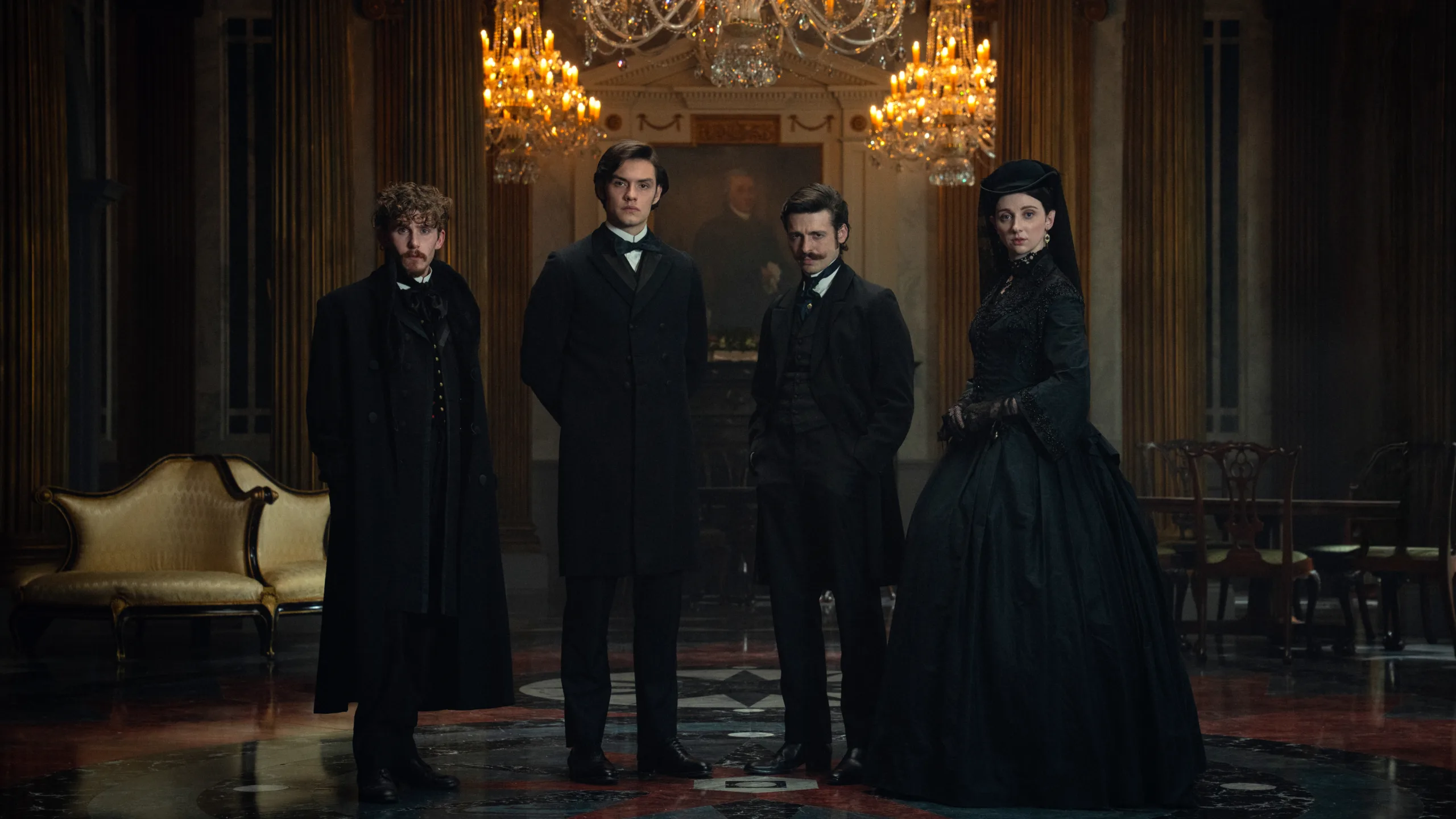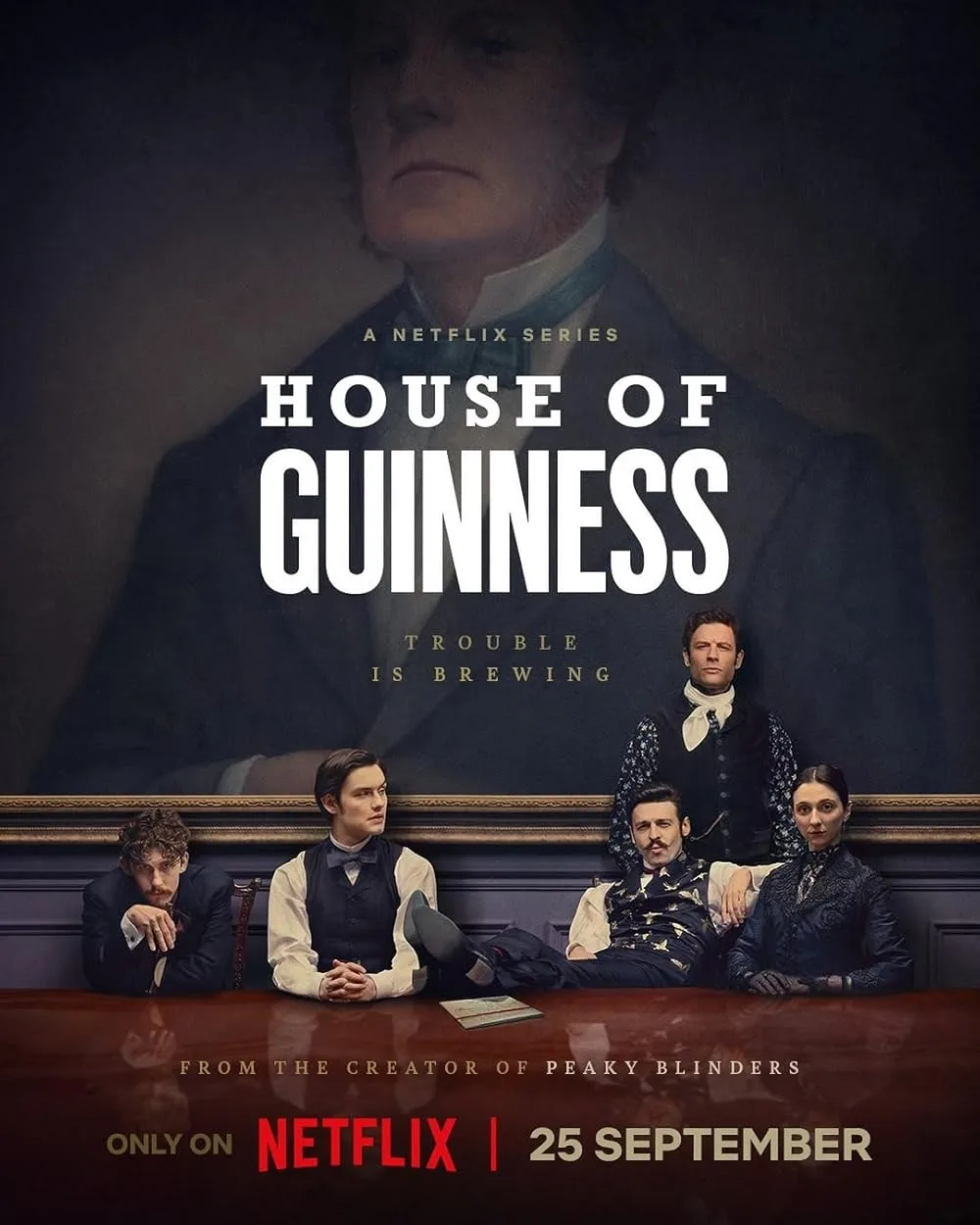It’s ironic, given the deep, rich flavors touted by the titular stout at the center of Netflix’s “House of Guinness,” that the show itself would feel so light and forthy. (The beer puns write themselves, but I’ll attempt to keep a thin head about it.) A prestige drama with hints of “Succession” and notes of “Peaky Blinders” (whose creator, Steven Knight, is also behind this), the show is a sprawling, splashy saga about the fight to keep the centuries-old stout manufacturer running amid political and personal turmoil in 1860s Dublin. It goes down easy, even if it has to take a few liberties to do so.
The beginning of each episode reads, “This fiction is inspired by true stories,” and the end credits note that the show is “Based on an idea by” Guinness descendant Ivana Lowell—though trust that Knight’s stylish, Guy Ritchie-esque presentation and the twists and turns of its characters feel more akin to “Dynasty”-esque soap opera than the real McCoy might imply. Like a tall boy of the good stuff, the show transports you back to 1860s Ireland, with the passing of Guinness scion Sir Benjamin McGuinness, a Protestant elite in a Catholic country that bristles against British rule and whose Fenian independents scramble to liberate Ireland from their oppressors.
With his passing, the fight for control of the vaunted beer company falls to Benjamin’s four children: eldest Arthur (Anthony Boyle), a conniving political hopeful with a salacious secret; dour but ambitious Edward (Louis Partridge), alcoholic failson Benjamin (Fionn O’Shea), and kind but marginalized Annie (Emily Fairn). But it’s not long before Sir Benjamin’s will and testament dashes everyone’s hopes, to some degree: He declares that Arthur and Edward shall run Guinness equally together, with dire consequences should one of the two wish to depart the business without losing their inheritance. Annie and Benjamin, due respectively to the former’s loveless arranged marriage and the latter’s irresponsibility, get nothing but allowance and estates. With the die cast on all their fates, the Guinness children struggle to keep their lives and legacy intact, while an angry Ireland bares its teeth at them, and the promise of American expansion awaits them.
It’s a lush, full-bodied premise for a series like this, and to its credit, Knight brings his signature brio to the show’s presentation. Much like “Peaky Blinders” before it, “House of Guinness” is a showcase of bowler hats, smoke machines, waistcoats, and ornate Victorian-era mansions, with percussive editing and anachronistic needle-drops aplenty to give the show a wry modern spin. (Many of the tracks feature modern Irish protest groups like Kneecap and Shark School, weaving the Fenians’ yearning for independence into the show’s fabric.) Location cards and translated Irish Gaelic pop on screen in bold, colorful typeface, too, Knight all but daring you to look at and recognize a native language that groups like those aforementioned bands are trying to keep alive.
All this brashness can sometimes be overwhelming, with barrel fires and funereal fistfights happening as often as aching heart-to-hearts between forbidden loves. But it’s also part of the show’s addictive, bingeable formula—beautiful people pouring lager in smoky rooms while ruminating on the limitations that politics, capitalism, and love have set out for them. This is obviously most cleanly seen in the Guinness kids’ conflicts, both together and separately: Take Arthur, a homosexual whose sudden thrust into political and economic power leaves him especially unable to live and love the way he’d like. Boyle plays these agonies with a mixture of snobbish rebellion and staggering ache, which bounces nicely off the principled, if craven, performance of Partridge as Edward. The two squabble for their own slice of the pie, but “House of Guinness” allows them the dignity of coming together in moments of crisis, even as their love lives lead them into lavender marriages (for Arthur) and politically inconvenient romances with Fenian rebels (for Edward). The same goes for Fairn’s Annie, who struggles to make a life for herself as a woman of significant means and non-existent power; her quest to channel her modest influence into Guinness’ real-world penchant for philanthropy remains thrilling. Poor Benjamin gets the least to do, only popping in every so often to try to get his piece of the shepherd’s pie, functioning best in scenes with the other siblings.
But the supporting cast is also phenomenal, even as the roster gets so sprawling it can be hard to keep track at times. James Norton’s Sean Rafferty is a standout, a smirking brute who prides himself on cracking a skull or two to keep the Guinness brand safe from Fenian revolutionaries. Arthur’s arranged wife, Olivia (Danielle Galligan), enters the union with a clear, modern head for how such a loveless marriage contract would work, even as she bristles against the discretion imposed on her own loves. The biggest and most entertaining swings, however, come from “Game of Thrones”‘ Jack Gleeson as Byron Hedges, a smirking working-class Guinness bastard who enters the arena hoping to connive his way into both family and fortune, using his Fenian contacts as a go-between as they expand into the States. With his thin features, big woolen coats, and twerpy swagger, Gleeson’s vibe is that of the Joker as filtered through the Lucky Charms leprechaun. It’s brash and reptilian and decidedly entertaining to watch.
Granted, the show’s pacing gets herky-jerky as it progresses, especially as the breakneck pace slams through one or more awkward time jumps in its latter episodes. What’s more, the characters all attack similar anguishes from different angles (i.e., will I be able to keep power and love?), which can get a little repetitive the further you go. But there’s something addictive about the intoxicating effect of “House of Guinness,” for all its watered-down corporate intrigue and the sneaking feeling that this ornate costume drama, filled with fire and sex and scheming, is just one big commercial for a beer company that doesn’t need any more help permeating the global booze firmament. It might not be all that good when binged all at once. But consumed in moderation on a gloomy day, it could be the cure for what ales ya.
Full series screened for review. Currently streaming on Netflix.




















